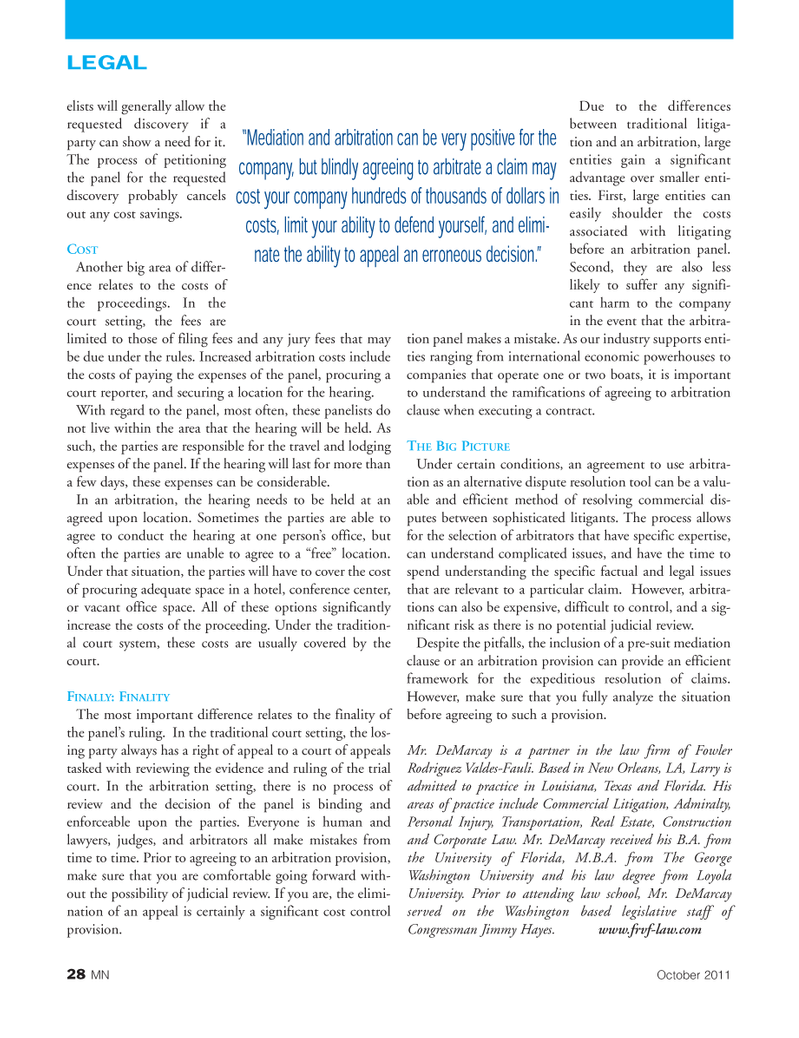
Page 28: of Marine News Magazine (October 2011)
The Yearbook
Read this page in Pdf, Flash or Html5 edition of October 2011 Marine News Magazine
28MNOctober 2011elists will generally allow the requested discovery if a party can show a need for it. The process of petitioning the panel for the requested discovery probably cancels out any cost savings.COSTAnother big area of differ- ence relates to the costs of the proceedings. In the court setting, the fees are limited to those of filing fees and any jury fees that may be due under the rules. Increased arbitration costs include the costs of paying the expenses of the panel, procuring a court reporter, and securing a location for the hearing. With regard to the panel, most often, these panelists do not live within the area that the hearing will be held. As such, the parties are responsible for the travel and lodging expenses of the panel. If the hearing will last for more than a few days, these expenses can be considerable. In an arbitration, the hearing needs to be held at an agreed upon location. Sometimes the parties are able to agree to conduct the hearing at one person?s office, but often the parties are unable to agree to a ?free? location. Under that situation, the parties will have to cover the cost of procuring adequate space in a hotel, conference center, or vacant office space. All of these options significantly increase the costs of the proceeding. Under the tradition- al court system, these costs are usually covered by the court. FINALLY : FINALITY The most important difference relates to the finality of the panel?s ruling. In the traditional court setting, the los- ing party always has a right of appeal to a court of appeals tasked with reviewing the evidence and ruling of the trial court. In the arbitration setting, there is no process of review and the decision of the panel is binding and enforceable upon the parties. Everyone is human and lawyers, judges, and arbitrators all make mistakes from time to time. Prior to agreeing to an arbitration provision, make sure that you are comfortable going forward with- out the possibility of judicial review. If you are, the elimi- nation of an appeal is certainly a significant cost control provision. Due to the differences between traditional litiga- tion and an arbitration, largeentities gain a significantadvantage over smaller enti- ties. First, large entities can easily shoulder the costsassociated with litigatingbefore an arbitration panel. Second, they are also less likely to suffer any signifi-cant harm to the companyin the event that the arbitra- tion panel makes a mistake. As our industry supports enti- ties ranging from international economic powerhouses to companies that operate one or two boats, it is important to understand the ramifications of agreeing to arbitration clause when executing a contract. THEBIGPICTUREUnder certain conditions, an agreement to use arbitra- tion as an alternative dispute resolution tool can be a valu- able and efficient method of resolving commercial dis- putes between sophisticated litigants. The process allows for the selection of arbitrators that have specific expertise, can understand complicated issues, and have the time to spend understanding the specific factual and legal issuesthat are relevant to a particular claim. However, arbitra- tions can also be expensive, difficult to control, and a sig- nificant risk as there is no potential judicial review. Despite the pitfalls, the inclusion of a pre-suit mediation clause or an arbitration provision can provide an efficient framework for the expeditious resolution of claims. However, make sure that you fully analyze the situation before agreeing to such a provision. Mr. DeMarcay is a partner in the law firm of Fowler Rodriguez Valdes-Fauli. Based in New Orleans, LA, Larry is admitted to practice in Louisiana, Texas and Florida. His areas of practice include Commercial Litigation, Admiralty, Personal Injury, Transportation, Real Estate, Construction and Corporate Law. Mr. DeMarcay received his B.A. from the University of Florida, M.B.A. from The George Washington University and his law degree from Loyola University. Prior to attending law school, Mr. DeMarcay served on the Washington based legislative staff of Congressman Jimmy Hayes. www.frvf-law.com LEGAL?Mediation and arbitration can be very positive for the company, but blindly agreeing to arbitrate a claim may cost your company hundreds of thousands of dollars in costs, limit your ability to defend yourself, and elimi- nate the ability to appeal an erroneous decision.? MN#10 (18-31):MN 2011 Layouts 10/5/2011 11:22 AM Page 28

 27
27

 29
29
